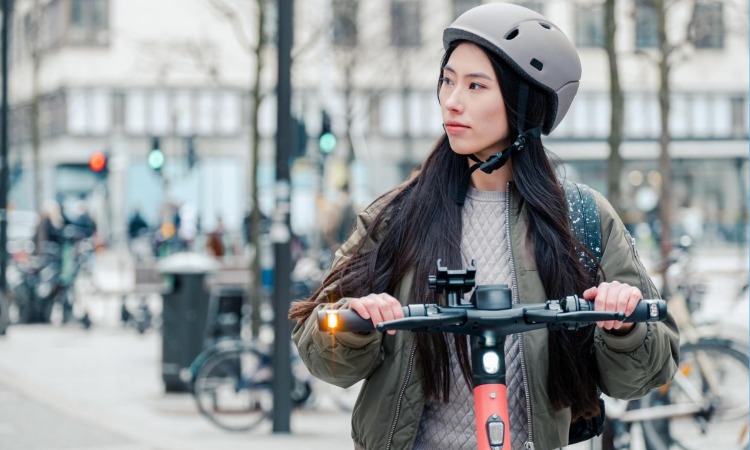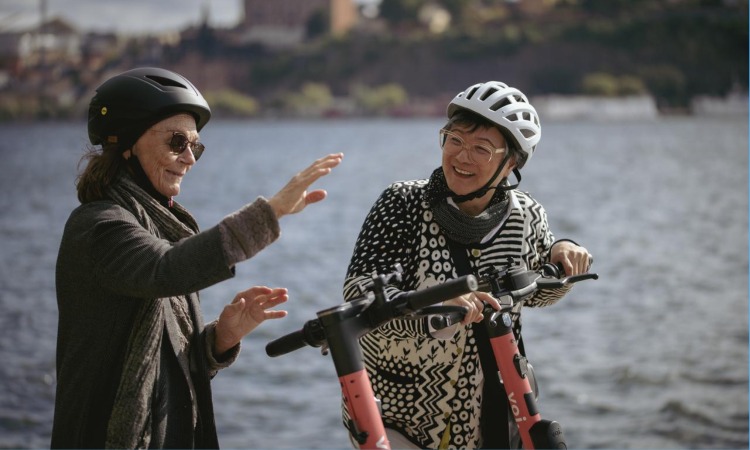Voi Technology releases new report identifying solutions to increase gender equity in e-scooter usage
- Like
- Digg
- Del
- Tumblr
- VKontakte
- Buffer
- Love This
- Odnoklassniki
- Meneame
- Blogger
- Amazon
- Yahoo Mail
- Gmail
- AOL
- Newsvine
- HackerNews
- Evernote
- MySpace
- Mail.ru
- Viadeo
- Line
- Comments
- Yummly
- SMS
- Viber
- Telegram
- Subscribe
- Skype
- Facebook Messenger
- Kakao
- LiveJournal
- Yammer
- Edgar
- Fintel
- Mix
- Instapaper
- Copy Link
Posted: 16 May 2022 | Intelligent Transport | No comments yet
With insight from nearly 500 women, the new report examines how gender equity in e-scooter usage can be increased by identifying the challenges women experience, alongside recommendations that can help to overcome them.


Credit: Voi Technology
European micro-mobility operator Voi Technology has partnered with Women in Transport to carry out in-depth research into e-scooter use, which has been reviewed and analysed by Voi’s newly launched Gender Equity Commission for shared e-scooters.
The results and industry-wide recommendations provided by the commission will be presented at an All-Party Parliamentary Group for Women in Transport meeting, that is taking place at the House of Commons on 16 May 2022.
The Shared e-scooters and gender equity research findings have been summarised into five subject areas, which include the perceived benefits and disadvantages of riding shared e-scooters, perceptions of shared e-scooter riders, knowledge and understanding, service design, and perceptions of infrastructure. The findings of the research, which was in the form of both a questionnaire of nearly 500 women and five focus groups, relate not only to Voi but to the micro-mobility sector as a whole.
Key findings and recommendations
Lack of safety
Of all the respondents, 79 per cent said that not feeling safe due to infrastructure was a barrier to further riding. Thus, the commission recommended that local and national governments should place the development of infrastructure and re-allocation of road-space in cities at the heart of their mobility frameworks, and at the top of their wider transport, environmental and public health agendas.
Attitudes towards e-scooter riders
In addition, 83 per cent of survey respondents strongly agreed that drivers’ and other road users’ attitudes towards e-scooter riders was a barrier to further using the micro-mobility vehicles. In order to improve this, the commission recommended that local authorities should provide clear, positive communications about the status of shared e-scooters in their regions.
Time of day
While 90 per cent of respondents strongly agreed strongly that they were confident riding a scooter during the day, this reduced to only 64 per cent during the night. The commission suggested that local authorities and e-scooter operators should collaborate to ensure local environments and cultures support night-time safety for women, for example, ensuring public spaces are sufficiently lit, and providing bystander awareness and education to help prevent violence and harassment of women and girls.
Location of parking docks
When not located in safe and useful areas, 83 per cent of respondents have said that docking locations can be a barrier to riding. To tackle this, the commission has recommended that local authorities and e-scooter operators should collaborate to ensure women’s transport needs and experiences inform the development of e-scooter regulation and services in specific areas, particularly the location of parking docks and development of infrastructure.
Unclear laws and regulations surrounding e-scooters
Although 99 per cent of regular riders understood the difference between private and shared scooters, 59 per cent of non-riders said that their lack of understanding of laws and regulations surrounding e-scooters was a barrier to riding them. The commission recommended that governments should provide clarity and certainty over laws around both shared and private e-scooters.
Voi launches Gender Equity Commission to close e-scooter rider equity gap
Voi Technology takes action
Following the report’s findings, Voi has taken a number of steps to address the challenges posed by women when it comes to using shared micro-mobility. With night-time travel proving to be a significant barrier to women travelling by e-scooter, the company will be piloting night-time safety events in various European countries, including the UK.
In addition, Voi has launched a new Gender Safe Parking Standard, which will involve the technical assessment of parking locations based on agreed metrics mapped to a number of indicators that are directly related to women’s safety, to make sure the micro-mobility operator’s Parking Zones meet the requirements.
Finally, Voi Technology will commit to publishing ridership figures in all of its markets, where data is available. To date, these statistics show that 30 per cent of its riders in the UK are women and that the company’s latest model, Voiager 5, also pioneered a more inclusive design such as featuring a more ergonomic handlebar where the brakes, indicator switch and bell are accessible to the average woman’s hand size. Voi is committed to ensuring that future micro-mobility vehicles will continue to prioritise universal design and include gender mainstreaming principles.


Credit: Voi Technology
Fredrik Hjelm, Co-founder and CEO of Voi Technology said: “Our overall mission is to create safe, sustainable and reliable micro-mobility for everyone, and we are committed to taking women’s needs seriously. We are delighted to have worked with Women in Transport and the Gender Equity Commission, and are excited to be acting upon their findings and recommendations. By collaborating closely with cities and governments, we can ensure that measures to address barriers that women may have in enjoying e-scooters and feeling safe in doing so will continue to be addressed, in particular with our new Gender Safe Parking Standard.”
Jo Field, President of Women in Transport and Chief Executive of JFG Communications, said: “The gender gap in shared e-scooter use deserves considerable attention from the micro-mobility sector, and anyone else concerned with gender equity in transport and the urban realm. We are delighted to have partnered with Voi on this research, and to have helped develop a robust set of recommendations to move the sector forward. We urge policy makers and e-scooter operators to closely consider the findings and, crucially, take action based on the recommendations.”
Voi was the first micro-mobility company to join Women in Transport, as part of its roadmap to inclusive transport and, in August 2021, in partnership with public affairs agency JFG Communications, the two organisations initiated this research process in order to fully address and act upon the ongoing gender imbalance in ridership.
Related topics
Accessibility, Air Quality, Mobility Services, On-Demand Transport, Passenger Experience, Sustainable Urban Transport, Vehicle & Passenger Safety
Related modes
Bikes & Scooters
Related countries
United Kingdom
Related organisations
Gender Equity Commission, Voi Technology, Women in Transport
Related people
Fredrik Hjelm, Jo Field








